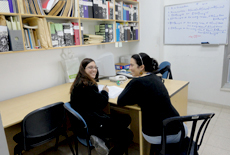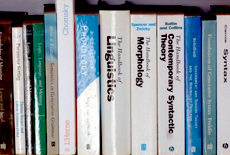Superfish Menu
| About |
|
History The Department originated as a Linguistics program set up in 1966 within the English Department. The initiator of the program and later the founder of the independent linguistics department was Robert B. Lees. Lees moved permanently to Tel-Aviv University in 1969 from the University of Illinois, where he had been founder and chair of the Department of Linguistics in the mid 1960s. Robert B. Lees was one of the fathers of the discipline of modern generative linguistics as it emerged in the United States in the 1950s and early 1960s owing to the work of the linguist and philosopher Noam Chomsky. In the late 1950s, before the first generative linguistics program has even been established, he obtained his PhD in linguistics within MIT's department of electrical engineering. His was the first linguistics PhD dissertation at MIT, and the first dissertation in the generative-transformational framework in the world. As a close associate of Noam Chomsky in the early 1960s, Lees played a central role in the promotion and elaboration of the Chomskyan approach to the study of natural language and the human language faculty at its inception. After moving to Israel, he founded the Linguistics program at Tel-Aviv University. This was the first such program in Israel, and in fact the first program anywhere outside of the United States with a clear generative (cognitive-biological) orientation. In 1971 the linguistics program separated from the English department, and became a fully autonomous unit (within the Faculty of Humanities), which has evolved into today's Department of Linguistics. Our vision and aims The main objective of our study program is to educate top-quality future researchers in the various domains of theoretical linguistics. We aim to foster excellence in research that provides original contributions to the field of theoretical linguistics. Our BA and MA programs are designed to prepare the best of our students for pursuing studies towards the PhD degree, with the eventual goal of academic careers. In addition, our program aims to train experts that satisfy the demands of theoretical and applied domains outside of academia, such as natural language processing and other language-related aspects of hi-tech industries (including artificial intelligence), clinical work involving neurological and other language disorders, second language teaching, and other domains. The BA program in particular also has a secondary mission: educating students via the study of linguistics to rigorous, precise thinking, logical reasoning, and familiarizing them with the foundations and methodology of scientific research. The program itself has been constructed with the guiding principle to provide a balanced and well-rounded program, a program which is coherent yet non-dogmatic in its theoretical approach. Our vision has been to represent a variety of research domains, methodologies and theoretical approaches, which at the same time still enable fruitful interaction and cooperation within the department, as well as opening new avenues for joint interdisciplinary research with relevant domains, such as computer science, biology, brain science, cognitive studies. Our students are considered from very early on as associates in active research, rather than merely students. They may participate in research projects and are viewed as junior colleagues. |










